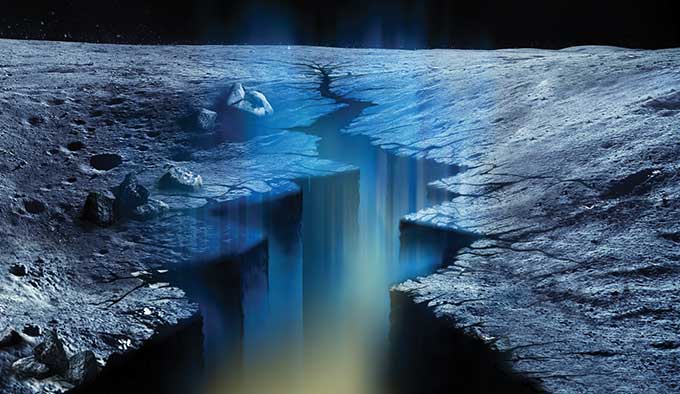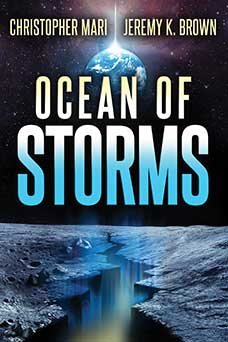What Will Sink Our Generation Ships? The Death of Wonder

In 2015, Kim Stanley Robinson wrote a compelling and sobering article for Boing Boing titled, "Our Generation Ships Will Sink." Robinson argued that humanity's hope for spreading among the stars, an ancient longing popularized during the Golden Age of science fiction, and later, the Golden Age of television and science fiction film, was an impossible longing that we would most likely never be able to fulfill. This grasping for the stars could not logically occur because of the physical, biological, ecological, sociological, and psychological limitations of human beings. In summary, Earth was our one and only home, and we are as intrinsically tied to it as the flora in our own guts are tied to us. If we go, they go. When Earth goes, we go.
 Christopher Mari and Jeremy K. Brown's Ocean of Storms is available from Amazon.
Christopher Mari and Jeremy K. Brown's Ocean of Storms is available from Amazon.There is a call to action in this epiphany, and it is that we must take care of this, our only home, and invest in it and its future with all the madness and passion we have invested in the stars.
While I agree wholeheartedly that we should invest in maintaining our home, I also recognize that this sobering damper on the speculative imagination is also dangerous. Focusing only on what is known, what can be seen and observed, when we are incredibly limited in what we can see and observe, breeds complacency. Cutting off a doorway, a possibility, is a rejection of innovation. There is no greater threat to progress than the phrase, "That's impossible."
I, too, write speculative worlds. I also live in a world that was once speculative to the generations that came before me. I do impossible things today - flying in a great metal bird in the sky, pulling maps from satellites circling the earth as I drive, crossing impossible distances in a vehicle that burns dead dinosaurs for fuel.
If we figured out how to jettison ourselves from the Earth, we can figure out how to alter ourselves to traverse the incredible distances between stars and even galaxies. And here, then, is the difference in ideas that drives my writing as opposed to that of many other science fiction writers. I understand that space travel and expansion is just as much about altering ourselves, our attitudes, our social structures, our very biology, as it is about altering the places we choose to live.
Robinson is right that the distances are long, that we are reliant on Terran bacteria, that our current starship technology cannot sustain us, that human psychology and physiology are not optimized for deep space, let alone new planets. But at no point does Robinson's piece consider that to take the stars we will have to change ourselves. In fact, we will have to interrogate what it is to be human, and remake the human body and mind. Much of our science fiction still looks out at the universe from the vantage of the colonizer: we are the Galactic Empire, imposing our Terran biological needs on the unsuspecting lands - populated or not - where we plant our flags. Instead, we must reframe this expansion as an evolution of humanity. We must see ourselves not as colonizers or parasites, but as organisms seeking symbiosis with the ecological systems of other worlds. Because if we go into space as colonizers, then yes, Robinson is right: we will absolutely fail.
Many science fiction novels focus on the nuts and bolts of engineering and physics while ignoring or glossing over concerns related to biology and sociology, the much-dismissed "softer" sciences that most likely the key to helping us reach the stars. The left-brain wants something predictable, knowable; it wants a button to push, and a clear line of causation. But organic life is a lot messier than a computer switch.
For a short time, this button-pushing future created only on what is known instead of what could be possible led to the attempted science fiction "mundane SF" movement, which suffered from lackluster branding (who wants to read something mundane?) and a depressing lack of wonder ("we're all going to die!" isn't exactly an inspiring message). Human beings thrive on imagination and pushing boundaries and limitations. Imposing limits when we don't actually have any true idea of what's possible is like imposing a steel trap over the mind.
So much of the future and the possible is unknown that when we build it, we have to reach for the fantastic. Take the current pace of discovery and progress in materials science, immunotherapy, quantum mechanics, and leap forward two hundred, three hundred, five hundred years. How much of what we believe to be true now will still be true? How many immutable facts will turn out to be, well, mutable?
Robinson likens generation ships to islands, and like islands, notes that they would be especially vulnerable to disease and blight, and incursions from rapidly evolving bacteria. Our bodies would change in unknown ways. This is true. I would argue, then, that we need to think of our generation ships not as metal islands, but as organic, fleshy worlds unto themselves, with interconnected ecosystems. What happens when the starship itself is a biological organism, a living and breathing thing, and we are the fauna living its guts?
This was a concept I explored deeply in my novel, The Stars are Legion. Because certainly, we will change if we create and inhabit a living organism to which we are intrinsically tied. The Earth has shaped our evolution in every way, and our world-ships will no doubt do the same. Perhaps we'll never be able to leave these ships. But propelling ourselves across the universe inside a self-sustaining world that can repair and reproduce itself solves the problems of distance and reduces the chance of ecological collapse, particularly if the worlds moved together as a legion and included independent layers of systems so that if one began to decline, another would rise. Think of it as naturally evolving back-up systems.
Those who arrive in the next star system, if they have created societies that allow them to change what we currently consider to be the intrinsically human foibles of war and strife and pettiness and bickering, will require time to adapt to a new environment. Consider how symbiotic parasites can chemically change and shape their hosts to suit them. Now imagine a ship is programmed to merge its flora and fauna with a new planet when it arrives, making the world-ship, now, into a living terraforming machine, a bacterial incubator that rapidly adapts the local environment to sustain its hosts. If symbiotic parasites can do this here on earth, why can't we hurl something like it through space?
Creating a future requires a profound and yes, unrealistic, vision of what is possible. But it is fantasy and wonder that drive technology and innovation. The stories of Pygmalion and his statue come to life, the Star Trek communicator; even flight itself was once considered a mathematical impossibility. The Taser, too, was inspired by an outlandishly fictional "electric rifle" that was written into Tom Swift stories at the turn of the last century.
When science fiction writers ask why it is so many readers have turned away from science fiction, consider that in much of our work, readers experience a fear and exhaustion with the future. We are fatigued with ennui, obsessed with dystopia. Is it because many of us have lost our sense of wonder, our sense that anything is possible? Grounding us on our own planet, by necessity, limits the future of the human species and locks us into an inevitable end.
Certainly, let's invest in our planet and take care of our only home. But it's also true that our star will eventually expand and destroy us, even if we are clever enough not to destroy ourselves first. Seeing the end of one's species, however likely, doesn't inspire innovation, only despair, no matter how far out that future may be.
We must continually look past what is possible, and even what is probable, if we want to inspire the creation of a more hopeful and lasting future. We can never stop reaching for the stars.
Christopher Mari was born and raised in Brooklyn, New York, and was educated at Fordham University. He has edited books on a wide variety of topics, including three on space exploration. His writing has appeared in such magazines as America, Current Biography, Issues and Controversies, and US Catholic. His next novel, The Beachhead, was published by 47North in 2017. He lives with his family in Queens, New York.